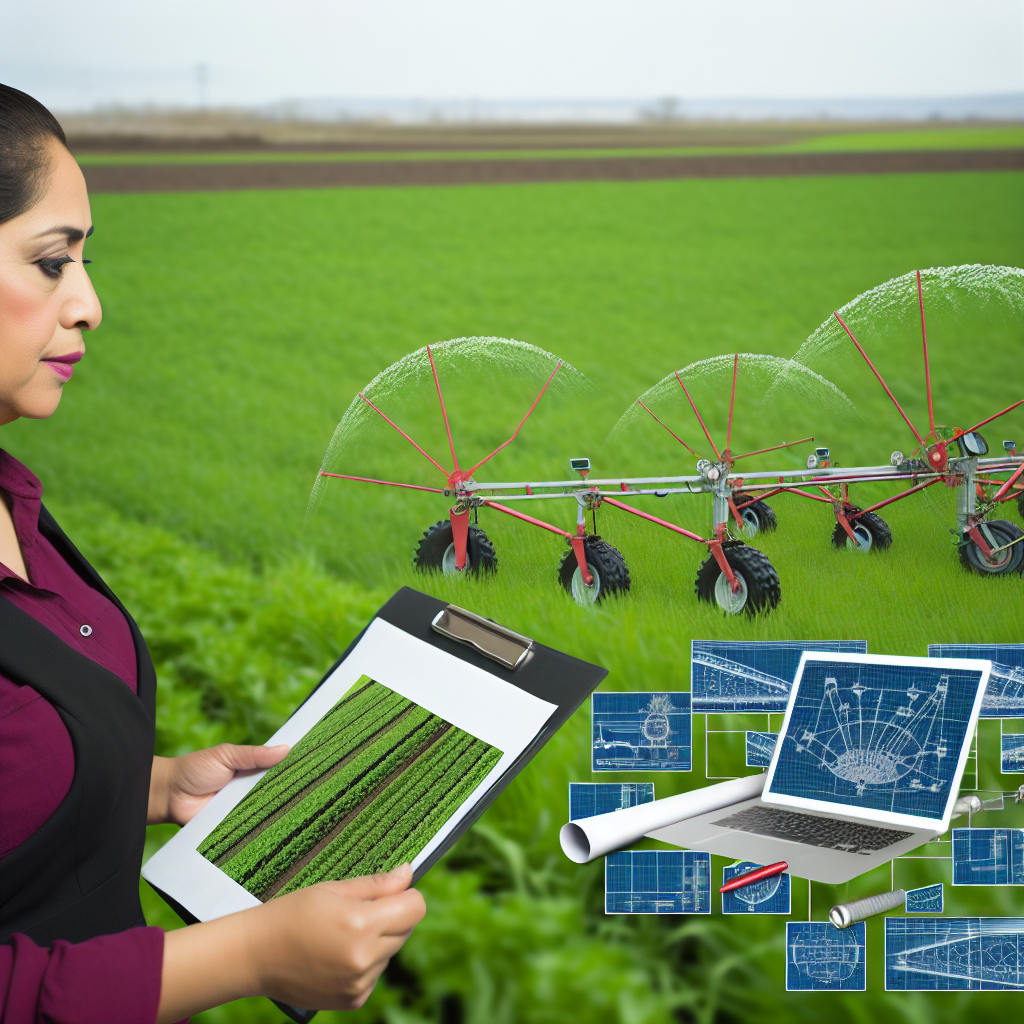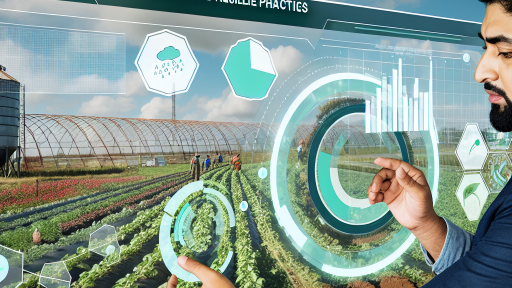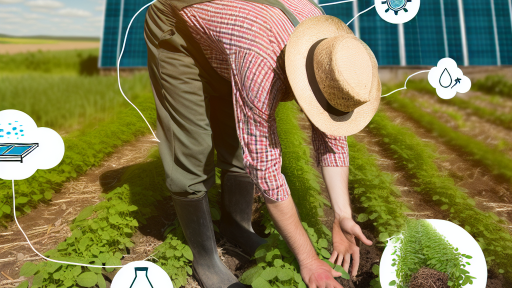Introduction to Water Recycling in Agriculture
Water recycling in agriculture is becoming increasingly important.
It conserves valuable water resources while supporting crop growth.
Farmers are constantly seeking sustainable methods to enhance productivity.
Implementing water recycling practices helps achieve this goal.
Importance of Water Recycling
Water scarcity poses a significant challenge globally.
Many regions experience drought, affecting agricultural output.
Recycling water addresses this critical issue efficiently.
Farmers can use treated wastewater for irrigation purposes.
This method reduces dependence on dwindling freshwater supplies.
Benefits of Water Recycling
Using recycled water prevents the wastage of valuable resources.
It also lowers the overall cost of irrigation.
Additionally, it promotes environmental sustainability.
Farmers can reduce nutrient runoff by using treated water.
This practice enhances soil health and crop yields.
Challenges in Implementing Water Recycling
Despite its benefits, implementing water recycling faces challenges.
Transform Your Agribusiness
Unlock your farm's potential with expert advice tailored to your needs. Get actionable steps that drive real results.
Get StartedSome farmers may lack knowledge of proper techniques.
Infrastructure investments can also pose financial hurdles.
Moreover, safety concerns regarding water quality persist.
Education and support are crucial for overcoming these challenges.
Overview of Current Water Usage in Agriculture and the Need for Recycling
Understanding Water Demand
Agriculture accounts for a significant portion of global freshwater usage.
It is estimated that about 70% of the world’s freshwater goes to this sector.
Thus, water scarcity poses a substantial threat to farming practices.
Farmers rely heavily on irrigation to sustain crop yields and livestock.
The Impact of Climate Change
Climate change exacerbates water scarcity issues.
Changing weather patterns lead to prolonged droughts in some regions.
This situation forces farmers to rethink their water strategies.
Moreover, excessive rainfall can also cause water runoff and soil erosion.
Consequences of Poor Water Management
Inefficient water management negatively affects crop production.
This inefficiency results in wasted resources and lost profits.
In addition, it can degrade soil quality and harm ecosystems.
Consequently, farmers experience decreased productivity over time.
The Need for Innovative Solutions
Water recycling offers sustainable solutions to these challenges.
By reusing water, farmers can significantly reduce their reliance on freshwater sources.
Many innovative water recycling methods emerge to help agriculture adapt.
These methods not only conserve water but also enhance crop resilience.
Examples of Water Recycling Techniques
- Rainwater harvesting allows farmers to collect and store precipitation.
- Greywater reuse utilizes wastewater from domestic activities.
- Drip irrigation minimizes water loss through slow, targeted watering.
- Constructed wetlands naturally treat and recycle water for agricultural use.
Sustainable Practices in Agriculture
Embracing these innovative techniques is crucial for sustainable agriculture.
Farmers can secure their livelihoods while protecting vital water resources.
This approach ensures that agriculture remains viable in a changing climate.
Technological Innovations in Water Recycling
Introduction to Water Recycling in Agriculture
Water recycling significantly improves agricultural practices.
Showcase Your Farming Business
Publish your professional farming services profile on our blog for a one-time fee of $200 and reach a dedicated audience of farmers and agribusiness owners.
Publish Your ProfileFarmers utilize innovative methods to reclaim and reuse water.
This approach reduces water waste and enhances efficiency.
Advanced Irrigation Techniques
Drip irrigation allows targeted water delivery to crops.
This method minimizes evaporation and runoff.
Farmers can use sensors for precise water application.
Additionally, smart irrigation systems adjust based on weather forecasts.
Filtration and Treatment Systems
Advanced filtration removes impurities from recycled water.
Modern treatment methods ensure water quality is safe for irrigation.
Membrane bioreactors are gaining popularity in agricultural settings.
These systems effectively combine biological treatment and filtration.
Use of Greywater in Agriculture
Using greywater presents a sustainable alternative for watering crops.
Farmers can connect greywater systems directly to irrigation lines.
This practice reduces dependency on freshwater sources.
Moreover, it promotes environmental sustainability.
Rainwater Harvesting Techniques
Harvesting rainwater enhances water availability during dry seasons.
Farmers install collection systems to gather and store rainwater.
This technique lessens the demand for conventional irrigation.
Implementing rain barrels and cisterns proves beneficial and cost-effective.
Automation and Precision Agriculture
Automation technology transforms how farmers manage water resources.
Drones and remote sensing monitor soil moisture levels effectively.
This data helps optimize water usage and improve crop yield.
Farmers can make informed decisions based on real-time information.
Biotechnology in Water Recycling
Innovations in biotechnology aid in enhancing water recycling processes.
Bioengineered crops can thrive on recycled water more effectively.
Research continues to explore the potential of drought-resistant varieties.
This encourages sustainable water management practices in agriculture.
Collaborative Innovations and Practices
Partnerships among farmers, researchers, and technology providers enhance efficiency.
Knowledge sharing fosters the development of better recycling methods.
Collaborative efforts lead to innovative solutions to water scarcity.
Investing in research and development is crucial for future advancements.
Delve into the Subject: Climate-Smart Farming: Essential Adaptation Strategies
Case Studies: Successful Implementation of Water Recycling Methods in Different Regions
California’s Innovative Techniques
California has embraced modern water recycling techniques in agriculture.
Farmers utilize treated wastewater for irrigation effectively.
This method conserves precious freshwater resources significantly.
Additionally, recent pilot projects showcase promising results.
Collaborations between farmers and local governments are vital.
For instance, the Valley Water District has been instrumental in implementation.
Australian Approaches to Drought Management
Australia faces severe drought challenges impacting agriculture.
Farmers have adopted rainwater harvesting systems successfully.
These systems capture and store rainwater for future use.
Showcase Your Farming Business
Publish your professional farming services profile on our blog for a one-time fee of $200 and reach a dedicated audience of farmers and agribusiness owners.
Publish Your ProfileMoreover, the use of biofilters purifies the collected water.
This ensures safe and efficient irrigation practices.
Recent case studies highlight increased crop yields using this method.
Sustainable Practices in Israel
Israel is a leader in sustainable water use in agriculture.
The country employs advanced drip irrigation systems widely.
This technology minimizes water waste significantly during irrigation.
Additionally, many farms recycle wastewater effectively for irrigation.
Farmers conduct thorough treatments to ensure water safety.
These practices enhance both crop production and resource conservation.
Innovative Solutions in the Netherlands
The Netherlands utilizes unique water recycling practices in agriculture.
Farmers often implement constructed wetlands for wastewater treatment.
This method naturally filters and cleans the water effectively.
As a result, farmers can reuse water for irrigation sustainably.
Moreover, these practices align well with ecological practices.
Excitingly, crop quality has improved significantly in the region.
Find Out More: Renewable Energy Adoption in Sustainable Farming
Challenges and Limitations of Water Recycling in Agriculture
Technical Limitations
Water recycling technology often encounters technical difficulties.
In many cases, farmers lack access to cutting-edge equipment.
Additionally, existing systems may require complex adjustments.
Consequently, the processes can become time-consuming and costly.
Economic Considerations
The upfront cost of water recycling systems can be high.
Many farmers struggle to secure funding for these investments.
Furthermore, the return on investment may take several years.
This financial uncertainty can deter agribusinesses from adopting new technologies.
Regulatory Barriers
Water recycling faces significant regulatory hurdles in agriculture.
Local regulations often impose strict guidelines on water quality.
These guidelines can complicate the recycling process.
Moreover, movement toward more sustainable practices often requires complex permits.
Public Perception
The perception of recycled water can impact its adoption.
Many consumers have concerns about the safety of recycled water.
These concerns can lead to hesitation in purchasing crops irrigated with recycled methods.
Ultimately, public education is essential for overcoming resistance.
Environmental Factors
Environmental conditions can also limit the effectiveness of water recycling.
In regions with extreme weather, water availability fluctuates drastically.
This unpredictability can hinder consistent recycling efforts.
As a result, farmers may face additional challenges in water management.
Uncover the Details: Renewable Energy Options for Climate-Smart Farms

Comparative Analysis: Water Recycling vs. Traditional Water Management Practices
Overview of Water Recycling Methods
Water recycling methods involve innovative techniques that reprocess used water for agricultural purposes.
These methods significantly reduce the reliance on fresh water sources.
Farmers can implement various technologies depending on their specific needs.
Showcase Your Farming Business
Publish your professional farming services profile on our blog for a one-time fee of $200 and reach a dedicated audience of farmers and agribusiness owners.
Publish Your ProfileBenefits of Water Recycling
Water recycling provides numerous benefits for agricultural efficiency.
It helps conserve water resources, especially in drought-prone areas.
Additionally, it can improve crop yields by providing a consistent water supply.
Farmers also benefit from reduced costs associated with water procurement.
Traditional Water Management Practices
Traditional water management practices primarily rely on surface water and groundwater sources.
This method often leads to over-extraction and depletion of these resources.
Farmers may face challenges during dry seasons due to limited water availability.
Comparative Analysis of Efficiency
Water recycling tends to be more efficient than traditional methods.
Studies show that recycling can reduce water usage by up to fifty percent.
Conversely, traditional practices often waste a significant amount of water.
Moreover, recycled water can be safer than using untreated water sources.
Environmental Impact
The environmental impact of water recycling is generally positive.
This approach minimizes the strain on natural water bodies.
Additionally, it reduces the amount of wastewater that contributes to pollution.
In contrast, traditional practices can exacerbate water scarcity and pollution issues.
Implementing Water Recycling in Agriculture
Farmers can implement various strategies for successful water recycling.
One common method is the use of greywater systems.
These systems treat water from sinks and showers for irrigation purposes.
Another effective approach involves rainwater harvesting techniques.
Storing rainwater reduces dependency on groundwater and surface water.
Challenges to Adoption
Despite numerous advantages, some challenges hinder widespread adoption.
Initial investment costs for recycling technologies can be high.
Moreover, there may be concerns regarding water quality and pathogens.
Education and awareness are essential to address these concerns.
Explore Further: Solar-Powered Irrigation Systems for Efficient Water Use
Future Trends in Water Recycling Technologies for Sustainable Agriculture
Emerging Technologies
Innovative technologies are reshaping water recycling methods in agriculture.
Advanced filtration systems are becoming increasingly popular.
These systems effectively remove contaminants from irrigation water.
Moreover, new sensors provide real-time data for efficient water management.
Decentralized Water Systems
Decentralized water recycling systems are gaining traction.
Farmers can install these systems locally to recycle water on-site.
This approach reduces transport costs and environmental impact.
Furthermore, it allows for customized solutions based on local needs.
Smart Irrigation Practices
Smart irrigation technology enhances water efficiency.
This includes automated systems that adjust based on weather conditions.
Farmers can conserve water while maintaining crop health.
Additionally, data analytics help optimize water usage over time.
Policy and Regulation Developments
Government policies are evolving to support water recycling initiatives.
Subsidies for water-efficient technologies incentivize farmers to adopt new methods.
Regulatory frameworks are improving to facilitate sustainable practices.
Showcase Your Farming Business
Publish your professional farming services profile on our blog for a one-time fee of $200 and reach a dedicated audience of farmers and agribusiness owners.
Publish Your ProfileAs a result, farmers can invest confidently in water recycling technologies.
Community and Cooperative Approaches
Collaboration among farmers can enhance water recycling efforts.
Cooperatives can share resources and knowledge on effective practices.
This approach not only reduces costs but also fosters innovation.
Communities can develop tailored solutions that benefit everyone.
Future Research Directions
Continued research will drive advancements in water recycling technologies.
Scientists are exploring new materials for better filtration systems.
Moreover, studies on plant-resilient irrigation methods are underway.
This research aims to maximize efficiency while preserving ecosystems.
Policy and Regulation: Supporting Innovative Water Recycling Practices in Agriculture
Importance of Policy Frameworks
Effective policies shape the success of water recycling in agriculture.
They provide guidelines for sustainable practices and innovation.
Moreover, robust regulations ensure safe water use in farming.
Government Incentives for Water Management
Governments can offer financial incentives to encourage water conservation.
Subsidies for water-efficient technologies motivate farmers to adopt new methods.
Tax breaks for recycling systems can further enhance adoption rates.
Legislation Surrounding Water Quality
Regulatory frameworks must address water quality standards.
Clear guidelines protect both crop health and consumer safety.
Furthermore, compliance with these standards builds public trust.
Collaboration Between Stakeholders
Successful water recycling programs require collaboration among various stakeholders.
Farmers, policymakers, and tech developers should work together.
This partnership fosters innovation while addressing common challenges.
Adapting to Regional Needs
Policies must be tailored to regional water scarcity issues.
Local governments should identify unique agricultural water needs.
This targeted approach enhances the effectiveness of regulations.
Research and Innovation Funding
Funding for research encourages innovative water recycling techniques.
Public and private investments can drive technological advancements.
This funding supports experimental projects that pave the way for new solutions.
Public Awareness and Education
Raising public awareness about water recycling benefits is crucial.
Educational programs can help farmers implement best practices.
Informed stakeholders are more likely to support innovative policies.
Additional Resources
Improving water-efficient irrigation: Prospects and difficulties of …
Biden-Harris Administration Announces National Strategy to Reduce …




